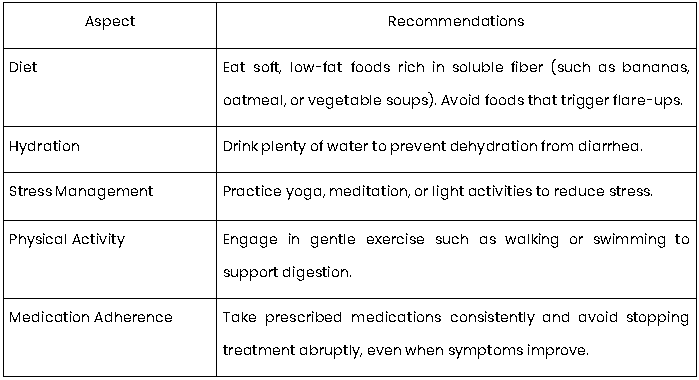By: Geraldus Sigap
/photo/2023/07/24/sick-woman-with-hands-stomach-su-20230724120250.jpg)
What is Inflammatory Bowel Disease (IBD)?
Inflammatory Bowel Disease (IBD) is a chronic condition in which the body’s immune system mistakenly attacks the digestive tract, causing long-term inflammation in the intestinal walls. IBD is not a simple digestive problem, it is a chronic, relapsing condition that can significantly affect one’s quality of life if left untreated.
There are two main types of IBD:
- Crohn’s Disease: Can affect any part of the digestive tract, from the mouth to the anus, most commonly the small intestine and colon.
- Ulcerative Colitis: Affects only the large intestine (colon) and rectum, leading to ulcers and bleeding in the inner lining of the bowel.
Common Symptoms to Watch Out For
IBD symptoms can appear gradually or suddenly, depending on the severity of inflammation.
Common signs and symptoms include:
- Abdominal pain or cramping that comes and goes
- Bloating and excessive gas
- Chronic diarrhea, sometimes mixed with blood or mucus
- Bloody stools without a clear cause
- Fatigue and unintended weight loss
- Loss of appetite
- Low-grade fever during flare-ups
In some cases, patients may also experience joint pain, mouth ulcers, or skin and eye problems due to inflammation outside the digestive tract.
Causes and Risk Factors
The exact cause of IBD is still unclear, but several factors are believed to contribute, including:
- Genetic predisposition (family history)
- Immune system dysfunction, where the body attacks its own intestinal tissue
- Environmental factors, such as a high-fat, low-fiber diet
- Chronic stress and unhealthy lifestyle
- History of smoking or prolonged use of non-steroidal anti-inflammatory drugs (NSAIDs)
Diagnosis of Inflammatory Bowel Disease
To establish a diagnosis, your doctor will perform a series of tests, such as:
- Blood and stool tests to detect inflammation or infection.
- Colonoscopy, to directly visualize the intestinal walls and take a tissue biopsy.
- CT scan or MRI of the intestines (Enterography), to identify inflamed areas in greater detail.
At RS Abdi Waluyo, examinations are supported by 3 Tesla MRI technology, providing high-resolution imaging that helps doctors accurately determine the location and extent of inflammation. In addition, RS Abdi Waluyo also provides capsule endoscopy, an advanced diagnostic technology that allows doctors to visualize the entire digestive tract using a tiny camera capsule swallowed by the patient. This examination is particularly useful for detecting subtle inflammation in the small intestine that may not be visible with conventional endoscopy.
Treatment and Management of IBD
The main goals of treatment are to control inflammation, relieve symptoms, and prevent relapses. Therapy may include:
- Anti-inflammatory medications such as mesalazine or corticosteroids to reduce inflammation.
- Immunomodulators or biologics to suppress excessive immune activity.
- Antibiotics if secondary infection is present.
- Lifestyle and dietary adjustments, including reducing fatty, spicy foods, alcohol, and caffeine.
- Surgery in severe cases, such as intestinal narrowing or uncontrolled bleeding.
Today, treatments for IBD are rapidly advancing with the development of targeted medical therapies. In addition to anti-inflammatory drugs and corticosteroids, immunomodulators and biologic therapies are now available, working directly to suppress the abnormal immune response that causes intestinal inflammation. Although these treatments remain limited in Indonesia, RS Abdi Waluyo is among the few hospitals that provide access to immunomodulator and biologic therapy for IBD patients, under the supervision of experienced gastroenterology specialists.
Lifestyle Tips for IBD Patients

When to See a Doctor
Seek medical attention immediately if you experience:
- Bloody or mucus-filled stools
- Diarrhea lasting more than two weeks without improvement
- Severe abdominal pain, extreme fatigue, or sudden weight loss
- A family history of IBD or autoimmune disease
Early diagnosis and treatment significantly reduce the risk of serious complications such as bowel obstruction, perforation, or colorectal cancer.
RS Abdi Waluyo is one of Indonesia’s leading IBD Centers, offering a one-stop service that covers the entire continuum of care, from diagnosis to treatment, in a single facility. Care is provided through a multidisciplinary team of specialists in internal medicine, gastroenterology, radiology, pathology, and nutrition. This comprehensive approach is essential, as IBD complications can affect not only the digestive tract but also other organs such as the joints, skin, and eyes. Through integrated, continuous care, patients receive precise evaluations and personalized treatment for optimal outcomes. Contact RS Abdi Waluyo at 021-3144989 or make an online appointment via https://abdiwaluyo.com/
References:
- McDowell C, Farooq U, Haseeb M. Inflammatory Bowel Disease. [Updated 2023 Aug 4]. In: StatPearls [Internet]. Treasure Island (FL): StatPearls Publishing; 2025 Jan-. Available from: https://www.ncbi.nlm.nih.gov/books/NBK470312/
- Fakhoury, M., Negrulj, R., Mooranian, A., & Al-Salami, H. (2014). Inflammatory bowel disease: clinical aspects and treatments. Journal of inflammation research, 7, 113–120.
